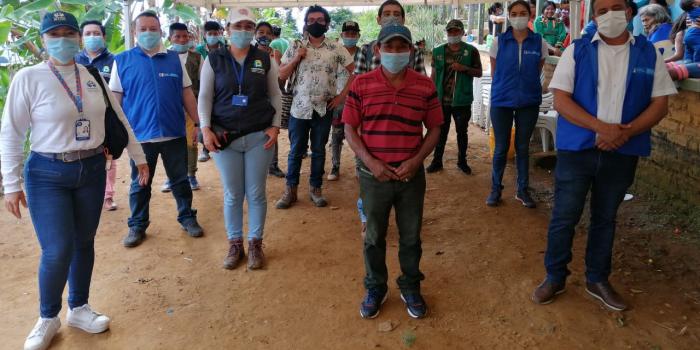
Unit developed community agreement with indigenous people in Buenavista, Quindío
The initiative seeks to reach agreements with the community to work on aspects such as the restitution and legal security of the territory, ethnosalud, ethno-education, psychosocial care with harmonization and income generation, among others.

The territorial director of Eje Cafetero of the Victims Unit, Laura Moreno, and the mayor of the Buenavista municipality, in Quindío, Alexis Gómez, led the community consultation session with the Dachi Nabe Drua indigenous community, whose objective is to promote and stimulate spaces for participation and agreement for the adjustment and validation of actions contained in the municipal return and relocation plans.
“The Victims Unit is doing this community consultation to be able to collect all these doubts that are in front of the road and clear them at once; Likewise, we are listening to the initiatives of the leaders, rebuilding the social network and ensuring that other entities of the State can arrive with their offer to really repair the community, managing to update the return plan”, argued Laura Moreno, during her visit to the farm El Aguacatal.
These plans and programs are carried out taking into account the principles of security, dignity and voluntariness, as well as collective ethnic rights in accordance with the territory, cultural identity, autonomy and self-government. This community is made up of 20 homes and 85 indigenous people who have been on the property for 4 years.
For his part, Alexis Gómez, mayor of Buenavista, indicated that "in the municipal administration we want to make an important effort for the benefit of all of you, although I understand that this indigenous community wants to adhere to a return plan in search of land much more productive, while they are here, they have the constant accompaniment of the Ombudsman's Office and the People´s Advocate; we want to work in a coordinated way and to be able to have productive projects in the artisan field”.
This community agreement takes into account aspects such as: The Life Plan: a planning instrument that is built from a participatory process of self-diagnosis and the exercise of project preparation. Safeguard Plan: social and administrative agreement through which actions are established to guarantee the safeguarding of intangible cultural heritage and the Ethno-development Plan: planning instrument aimed at preserving the condition of Community Councils.
"We invite all of us to build the plans and programs that the community really needs in order to improve the quality of life of our indigenous people, but we want that from the institutions we begin to see facts and be able to go from the workshops to the execution", commented Gilberto Borocuara, community leader and translator.
This initiative also seeks to reach agreements with the community to work on common fronts and aspects such as: the restitution and legal security of the territory, decent housing, basic public services, occupational orientation, income generation and work, food security, ethnosalud, ethno-education and psychosocial care with harmonization.
(End/EHB/CMC/LMY)






